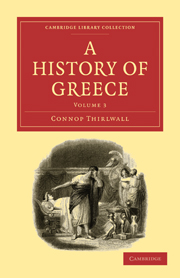Book contents
- Frontmatter
- Contents
- CHAPTER XVII FROM THE COMMENCEMENT OF THE ATHENIAN MARITIME ASCENDANCY TO THE THIRTY YEARS' TRUCE BETWEEN ATHENS AND SPARTA
- CHAP. XVIII FROM THE COMMENCEMENT OF THE THIRTY YEARS' TRUCE TO THE RENEWAL OF HOSTILITIES BETWEEN ATHENS AND CORINTH, WITH A GENERAL VIEW OF THE ADMINISTRATION OF PERICLES
- CHAP. XIX CAUSES AND OCCASIONS OF THE PELOPONNESIAN WAR
- CHAP. XX FROM THE COMMENCEMENT OF THE PELOPONNESIAN WAR TO THE END OF THE THIRD YEAR
- CHAP. XXI FOURTH AND FIFTH YEARS OF THE PELOPONNESIAN WAR
- CHAP. XXII FROM THE BEGINNING OF THE SIXTH YEAR OF THE PELOPONNESIAN WAR TO THE GENERAL PACIFICATION OF SICILY
- CHAP. XXIII FROM THE GENERAL PACIFICATION OF SICILY TO THE PEACE OF NICIAS
- CHAP. XXIV FROM THE PEACE OF NICIAS TO THE CONQUEST OF MELOS
- CHAP. XXV THE SICILIAN EXPEDITION BEFORE THE ARRIVAL OF GYLIPPUS IN SICILY
- CHAP. XXVI THE SICILIAN EXPEDITION FROM THE ARRIVAL OF GYLIPPUS TO ITS CLOSE
- APPENDIX
CHAP. XXIV - FROM THE PEACE OF NICIAS TO THE CONQUEST OF MELOS
Published online by Cambridge University Press: 05 July 2011
- Frontmatter
- Contents
- CHAPTER XVII FROM THE COMMENCEMENT OF THE ATHENIAN MARITIME ASCENDANCY TO THE THIRTY YEARS' TRUCE BETWEEN ATHENS AND SPARTA
- CHAP. XVIII FROM THE COMMENCEMENT OF THE THIRTY YEARS' TRUCE TO THE RENEWAL OF HOSTILITIES BETWEEN ATHENS AND CORINTH, WITH A GENERAL VIEW OF THE ADMINISTRATION OF PERICLES
- CHAP. XIX CAUSES AND OCCASIONS OF THE PELOPONNESIAN WAR
- CHAP. XX FROM THE COMMENCEMENT OF THE PELOPONNESIAN WAR TO THE END OF THE THIRD YEAR
- CHAP. XXI FOURTH AND FIFTH YEARS OF THE PELOPONNESIAN WAR
- CHAP. XXII FROM THE BEGINNING OF THE SIXTH YEAR OF THE PELOPONNESIAN WAR TO THE GENERAL PACIFICATION OF SICILY
- CHAP. XXIII FROM THE GENERAL PACIFICATION OF SICILY TO THE PEACE OF NICIAS
- CHAP. XXIV FROM THE PEACE OF NICIAS TO THE CONQUEST OF MELOS
- CHAP. XXV THE SICILIAN EXPEDITION BEFORE THE ARRIVAL OF GYLIPPUS IN SICILY
- CHAP. XXVI THE SICILIAN EXPEDITION FROM THE ARRIVAL OF GYLIPPUS TO ITS CLOSE
- APPENDIX
Summary
Among the various predictions which were current at the outbreak of the Peloponnesian war, one only, Thucydides observes, was known to have been fulfilled; and it was, that the war should last thrice nine years. He does not consider the temporary and partial suspension of hostilities which followed the treaties mentioned in our last chapter, as a sufficient ground for questioning the accomplishment of the prophecy, since it did not lead to a state of peace. The treaties were inscribed on pillars or tables of stone or brass, and preserved in the most revered sanctuaries; but they were for the most part a dead letter. This did not arise from the want of a sincere inclination for peace in the two highest contracting parties. The radical vice of the transaction was, that the Spartans had undertaken more than they were able to perform, and the Athenians would accept nothing less than they had bargained for. The treaty could not be carried into full execution without the concurrence of some of the allies of Sparta, who refused to accede to it, and though according to the acknowledged laws of the confederacy they were bound by the will of the majority, she had no means of enforcing their compliance. Several others were displeased with those parts of the treaty in which they were individually concerned, or had particular grounds of jealousy or discontent; and there was one clause in the treaty of alliance which created general offence and alarm.
- Type
- Chapter
- Information
- A History of Greece , pp. 311 - 363Publisher: Cambridge University PressPrint publication year: 2010First published in: 1836



